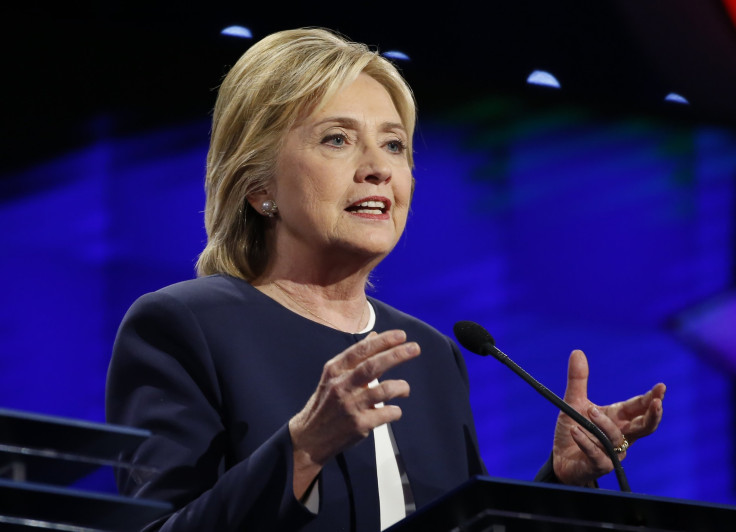At Democratic Debate, Hillary Clinton Defends Trans-Pacific Partnership Flip-Flop, Tells Anderson Cooper She's A Progressive

Former U.S. Secretary of State Hillary Clinton got the first question of the night at Tuesday's Democratic presidential debate, and it was a tough one. CNN moderator Anderson Cooper asked whether the candidate changed her position on issues to get in certain groups' good favor, essentially inquiring: "Will you say anything to get elected?"
Clinton's short answer was no. "I have been consistent over the course of my entire life. I have always fought for the same values and principles, but like most human beings, including those of us who run for office, I do absorb new information," she said. "I do look at what's happening in the world."
Cooper was referring partially to what critics have called Clinton's recent flip-flop on the Trans-Pacific Partnership, a 12-country trade deal aimed at promoting commerce by lowering or eliminating tariffs on certain goods. The countries finished their secret negotiations Oct. 5, but opponents -- many of them Democrats -- argued it could outsource too many American jobs, hurt the environment and protect drug companies.
Clinton, the front-runner in the Democratic 2016 race, repeatedly backed the TPP before finally taking a stance against it last week. "As of today, I am not in favor of what I have learned about it," she told PBS. "I have said from the very beginning that we had to have a trade agreement that would create good American jobs, raise wages and advance our national security, and I still believe that is the high bar we have to meet. I don't believe it's going to meet the high bar I have set."
Tuesday night, she reiterated that message. Clinton acknowledged that she had supported the deal during her time as secretary of state, even hoping that it would be "the gold standard," but once negotiations finished, she said: "It didn't meet my standards." She went on to defend the evolution of her position. "Like most people I know, I have a range of views," she said. "They are rooted in my values and my experiences."
When Cooper then asked the candidate to label herself a moderate or progressive, she chose the latter. "I'm a progressive, but I'm a progressive who likes to get things done," she said. "I know how to stand my ground, and I've proven that in every position that I've had."
Other candidates' views on the TPP varied. Former Maryland Gov. Martin O'Malley released a statement last week saying that Clinton's change of heart was political. He's against the Trans-Pacific Partnership. "I believe we need to stop stumbling backwards into bad deals," O'Malley said. "Secretary Clinton can justify her own reversal of opinion on this, but I didn't have one opinion eight months ago and switch that opinion on the eve of debates."
Sen. Bernie Sanders, I-Vt., said he was "disappointed but not surprised" that the TPP was progressing. He characterized it as a "disastrous" deal for consumers and American jobs. "I will do all that I can to defeat the TPP agreement," he wrote on Twitter.
Former Rhode Island Gov. Lincoln Chafee supports the deal, while former Virginia Sen. Jim Webb has said he's against it.
© Copyright IBTimes 2024. All rights reserved.












